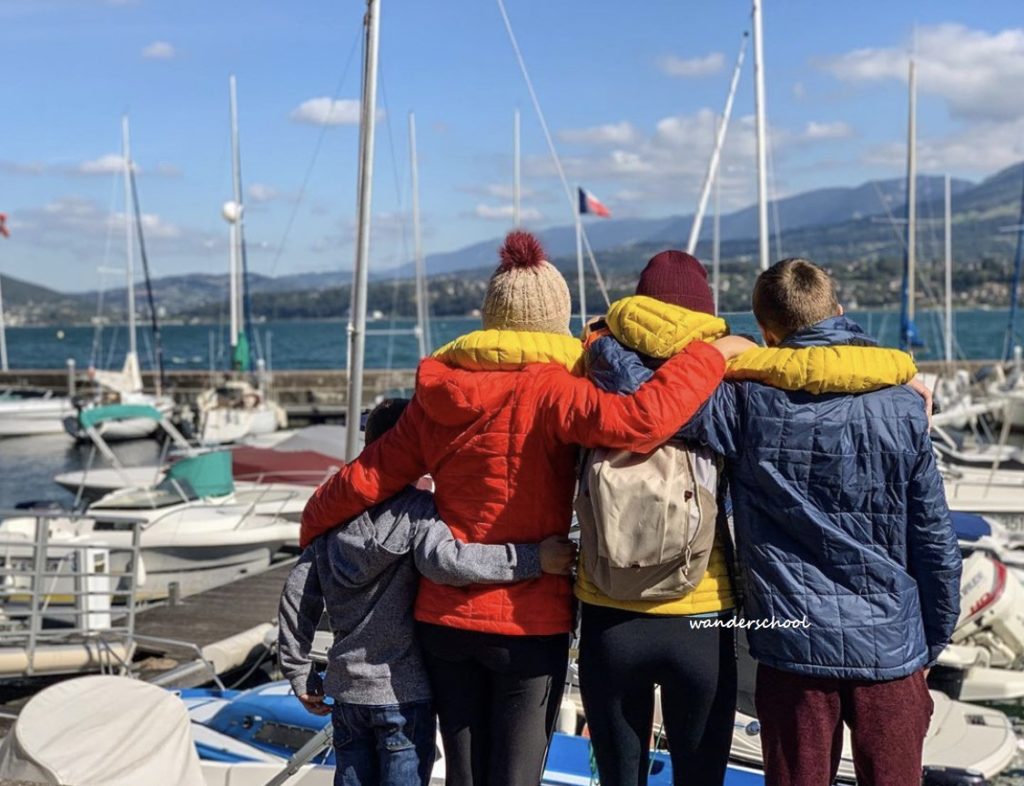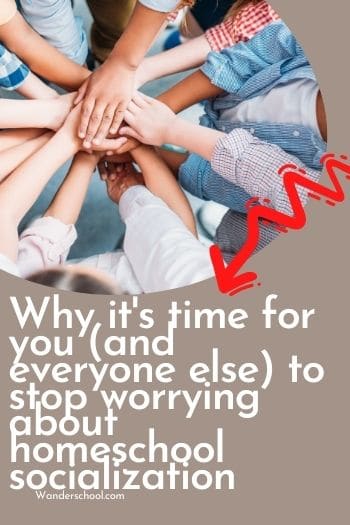
In this world nothing can be said to be certain, except death and taxes.” – Benjamin Franklin
Sorry, Ben, you missed one certainty. There’s the question that won’t ever go away.
The but what about homeschooling socialization question.
If homeschooler socialization is on your mind, read on. And, be sure to drop a comment at the end. I want to hear your thoughts.
Affiliate Links Disclosure: My posts sometimes contain affiliate links, which mean that if you click on them and make a purchase or sign up for an offering, I may earn a commission, at no added cost to you. I received no compensation for writing this post, and it reflects my own experiences, research, and opinions. You can read my my privacy policy here. Thank you so very much for reading my blog!
But what about socialization? That’s the homeschooling question that never dies.
And not only does this question never die, but there are endless variations of it.
These questions often begin with How Will Your Homeschooler…
- Socialize?
- Know how to interact with other kids?
- Make or have friends?
- Develop anything in common with other children?
- Lead a normal life or get a job someday?
- Develop self-confidence?
- Learn to stand up for herself?
- Develop thick skin to fight back?
- Learn to deal with bullying?
- And… What about yellow school buses, cafeteria lunches, parties and prom?
Do They Know Better Than You?
Sadly, the question of socialization, or its many variations, are all too often asked. Usually, they are asked with rude, accusatory, shame on you, or I know better than you arrogance or fake tones. Remarks and insidious tones, which are cleverly disguised to provoke a reaction out of the homeschooling parent or child.
Sometimes these socialization questions are asked out of fear. Other times, they are asked out of guilt. Sometimes doubt is the motivator. Doubt by parents who are fearful that perhaps they didn’t do something right, or are somehow less than perfect parents.
Still, sometimes the questions are asked because the person doing the asking is threatened by homeschooling. Or, they are threatened by the perception of homeschooling. Alternatively, they might be searching for ways to validate or justify their own school, parenting, work, or life choices.
Frequently it seems the what about socialization question comes up because the person asking seems to have an incorrect understanding about homeschooling and thinks a homeschooler is somehow deprived or lacking in social opportunities.
Far less often, the question about homeschooler socialization is asked out of genuine curiosity or interest in better understanding homeschooling or homeschoolers.
Imagine if these socialization questions were asked because people were genuinely and innocently curious about homeschooling. Sadly, that’s rarely the case.
This Obsession with ‘Homeschooler Socialization’ Suggests That Socialization Is the Most Important Part of Schooling or the School Experience
Sorry, not sorry, but there is so much more to educating a child than socialization.
What is socialization anyway? Who defines this concept of socialization?
Importantly, what does socialization even look like? Is socialization a case of, I know it when I see it?
Or is socialization like socializing puppies?
Puppies go to puppy school or out for walks to meet other dogs to get socialized. Puppies kept in isolation or who live with only one owner are sometimes known to have behavior or adjustment issues. For example, issues around other pets or people not from their household.
Does the puppy model of socialization apply to homeschoolers? For example, does the puppy model suggest that children can only get socialization by spending time with other children of the same young age, even though in life beyond the walls of a school classroom people ‘socialize’ and interact with people of all ages routinely?
For example, in a workplace, people of all ages typically work together, and are not grouped by age. Can you imagine what claims of age discrimination would be made if people could only work with others their same age?
If the puppy who goes on walks and is not-kept-in-isolation model defines socialization, then those who ask but what about socialization simply don’t get or misunderstand homeschooling.
Engaged, Active, and Outgoing Homeschooling Families
In my experience, homeschooling families are among the most active, engaging, and adventurous people I’ve met. Many of them, like my own family, are rarely at home because their homeschooling children have such full and enriching schedules outside of the house.
Sure, there are some homeschooling families who spend much of a typical school day time at home, but there are also a lot of ‘school’ families who spend their time after school hours at home and on weekends.
I think the far majority of homeschooling families are conscientious about giving their children a quality, well rounded experience. This includes exposing their children to opportunities outside of the home. As well, as exposing their children to opportunities to interact with others. If anything, these families are often quite conscious of socialization concerns and many surely overcompensate to combat socialization criticism.
What Does Socialization Mean Anyway?
Is socialization code word for conformity? Does it mean fitting in or behaving the same as others in your age group?
Or does socialization mean having a pre-defined number of friends?
Does socialization represent ‘coping’ with bullying, rude or damaging criticism by teachers, role models, or peers that cause life long mental health or body image issues?
Or does socialization mean ‘surviving’ peer pressure, teasing, or threats by students or friends at school?
Does homeschooling socialization mean surviving bullying?
It is heartbreaking to know there are parents wanting to (or are currently) homeschool their children because their children were scared or bullied by schools, family, friends, or strangers over socialization.
I can’t even begin to count how many people, including strangers, have asked me how I socialize my children.
Some have dared to suggest that my children might not be adequately socialized because they didn’t go to preschool. And still, others have suggested that because my children haven’t been bullied over their clothing brand choices or personal choices that they aren’t sufficiently socialized. Additionally, others have seemed skeptical about my children’s socialization because they didn’t attend a high school midnight hot-tub party.
I refuse to spend my time worrying about what others think about socialization. I also refuse to equate socialization with bullying. And I refuse to believe that surviving hostile school or childhood environments make better socialized kids.
And, I hope other homeschooling parents and those considering homeschooling will do the same to put the question but what about socialization to bed.
What homeschooling socialization means to me…
‘Socialization’ is when children are given, find, or create any opportunities to be decent humans and interact in ways that improve interpersonal/social skills, build self-confidence, and foster self-reliance, personal growth, and independence.
Over the years, my homeschoolers have spent much of their ‘school years’ traveling, exploring, taking classes, camps, activities, and workshops along the way, and meeting people of all ages and walks of life.
I don’t measure the number of friends they have or don’t have, or whether they ‘fit’ in as evidence of how socialized they are or aren’t.
My children make friends easily wherever they go. They have no issues with making conversation with people of any age. And they have played on a number of sports teams. They have taken dance and theater classes. My oldest has dated, gone to “real” parties, and attended ‘homeschool prom.’
However, in my mind, these things aren’t the measure of successful socialization. Rather, to me, the measure of successful or good socialization is evidenced when children:
- respect others, property, rules, and laws
- have healthy self-image
- have positive, loving, and safe relationships with parents, siblings, and ability to create them with others
- understand empathy
- have decent, perhaps even good, manners
- have skills and tools to interact with people of all ages
- understand and apply the ‘treat people how you’d like to be treated’ principle
- have self-confidence to handle social interactions, relationships, and problems throughout their lives
- have skills to communicate their feelings, needs, and boundaries
- understand where their comfort zone lies and what it means or feels like to go beyond that zone
- know when to ask for help or advice
Homeschooling Cultivates The Things Kids Need for Good Socialization
I can think of no better way or place to foster or promote ‘good’ socialization than through homeschooling. Especially homeschooling through travel!
If there is one thing I am certain of, it’s that schools continue to churn out students who demonstrate a lack of socialization in the areas that matter most. And that is something that everyone who asks homeschoolers about socialization should be really worried about.
And it’s exactly the reason why you are wasting your time worrying about what others think about your child’s socialization.
xx Julie
P.S. Seriously though, it’s no wonder homeschooler socialization is a question that won’t go away. These myths about homeschooling moms don’t seem to disappear either.
Share the Love – Share and Pin This!
Hey, if this post is helpful to you, please consider sharing with your friends and followers. Tweet it, share it, pin it!

Of course, drop a comment below, too. I’d love to hear your thoughts.
Follow Julie on Social Media! 😉
Subscribe to the Wanderschool Newletter. Get the latest travel news delivered right to your inbox.

